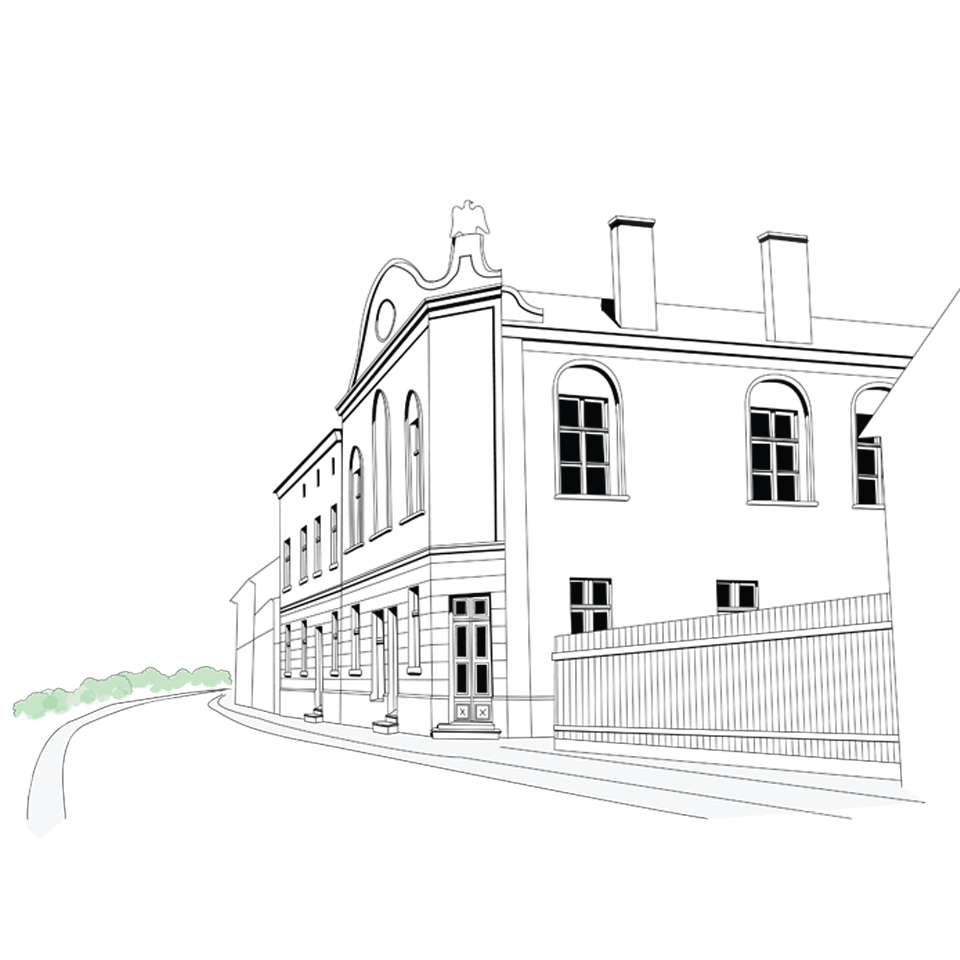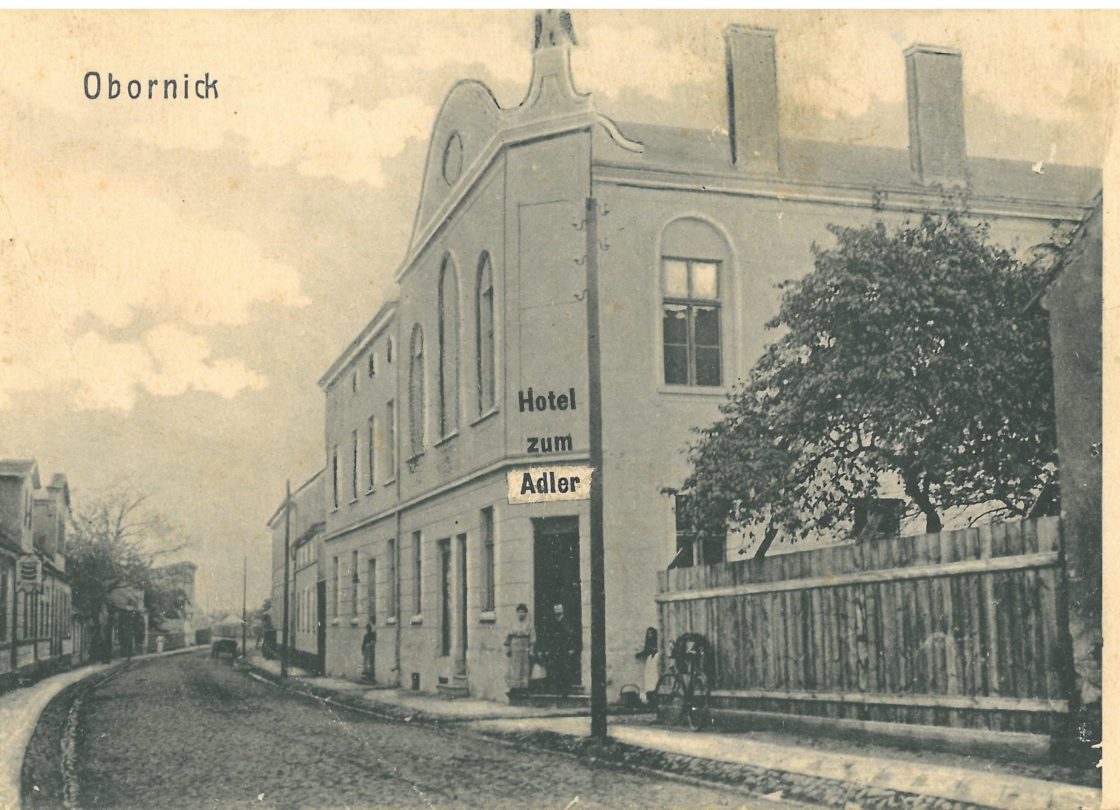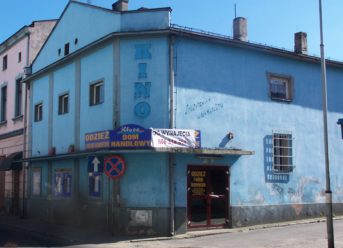Kamienica pod Orłem
Das Bürgerhaus
Tenement beneath the Eagle
Powstały przed pierwszą wojną światową budynek od początku związany był z działalnością kulturalną i rozrywkową. Zajmuje też ważne miejsce w patriotycznej historii Obornik. Był to jedyny polski lokal działający jeszcze przed wyzwoleniem miasta. Swoją siedzibę miały tu władze powstańcze oraz Rada Robotniczo-Żołnierska, tu też mieściła się powstańcza zbrojownia.
Hotel i restauracja „Pod Orłem”, swą działalność rozpoczęły w 1905 roku. Aż do wybuchu wojny stanowiły kulturalne serce miasta. W latach trzydziestych w hotelowej restauracji odbywały się liczne spotkania kulturalne i patriotyczne, prelekcje, zebrania, przedstawienia teatralne, operetkowe oraz projekcje filmów. Do 1951 roku działało tu upaństwowione kino „Muza”. W późniejszych latach Polski Ludowej, aż do roku 1990 funkcjonowało ono pod nazwą „Goplana”.
Gdy budynek powrócił do rodziny przedwojennych właścicieli wskrzeszono w nim również kino, tym razem pod nazwą Laterna Magica (magiczna latarnia). Wkrótce jego miejsce zajął Klub Kino, będący organizatorem dużych wydarzeń muzycznych, koncertów gwiazd, rockotek i dyskotek. Swoją działalność zakończył na początku XXI wieku. Dziś budynek pełni funkcje mieszkalne oraz handlowe, a strażnikiem więzi z przedwojenną tradycją jest, mieszcząca się w dalszej części budynku, Kawerna pod Orłem.
Das vor dem Ersten Weltkrieg errichtete Bürgerhaus war von Anfang an mit der Kultur- und Unterhaltungstätigkeit verbunden. Bereits im Jahre 1905 wurde im Gebäude das „Hotel zum Adler“ errichtet. Das Hotelrestaurant war vor der Befreiung das einzige polnische Lokal in Oborniki. Das Hotel spielte im patriotischen Leben der Stadt eine bedeutende Rolle - im Laufe der Zeit wurde es zum Mittelpunkt des gesellschaftlichen Lebens, wo Unabhängigkeitsideen entwickelt wurden. Vor dem Ausbruch des Groβpolnischen Aufstands, im Jahre 1918 war die Gaststätte ein Sitz der Arbeitet- und Soldatenrates. Das Bürgerhaus wurde auch als Treffpunkt der Aufständischen und ein Waffenkammer genutzt.
In den 30-er Jahren war das Hotel ein Herz des kulturellen Lebens der Stadt. Hier fanden zahlreiche kulturelle und patriotische Tagungen, Vorträge, Theateraufführungen und Filmveranstaltungen statt. Nach dem Zweiten Weltkrieg bis 1951 wurde im Gebäude ein verstaatlichtes Kino „Muza" errichtet, später in Kino „Goplana" umgewandelt, die erst in den 90-er Jahren geschlossen wurde.
Nach der Wende 1989 wurde das Bürgerhaus den Besitzern zurückgegeben, die im Gebäude das Kino errichteten, diesmal unter dem Namen „Latarna Magica“. In den nächsten Jahren wurde im Gebäude ein „Klub Kino“ - Veranstalter von groβen Konzerten, Rocktheken und Diskotheken - untergebracht.
Heute dient das Gebäude als ein Wohn- und Geschäftsbau. Die in der Vorkriegszeit gefangene Tradition ist von der „Gaststätte zum Adler“ (Kawerna pod Orłem) weitergeführt.
The Tenement was built before World War I, was from the beginning connected with cultural and entertainment activities. It also occupies an important place in the patriotic history of Oborniki. It was the only Polish place operating before the liberation of the city. It was the seat of the insurgent authorities and the Workers' and Soldiers' Council, and it also housed the insurgent armoury.
Hotel and restaurant „Beneath the Eagle”, started its activity in 1905. Until the outbreak of war it was the cultural heart of the city. In the thirties, the hotel restaurant hosted numerous cultural and patriotic meetings, lectures, theatre and opera performances and film screenings. Until 1951 the nationalized "Muza" cinema operated here. In the later years of the People's Republic of Poland, until 1990, it functioned under the name "Goplana".
When the building returned to the family of pre-war owners, the cinema was also revived there, this time under the name Laterna Magica (Magic Lighthouse). Soon its place was taken by the Cinema Club, which was the organizer of large music events, concerts of stars, rock and discos. It ended its activity at the beginning of the 21st century. Today, the building has residential and commercial functions, and the guard of the bond with pre-war tradition is the „Kawerna pod Orłem” (Café under the Eagle), located in the further part of the building.




